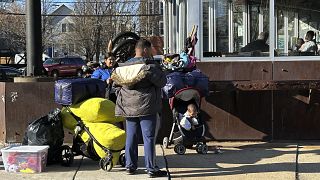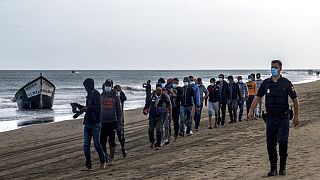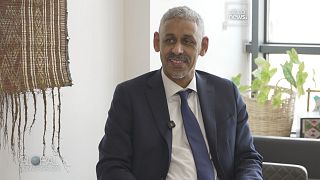Mauritania
Aissata Sall was scrolling through WhatsApp in May when she first learned about the new route from Mauritania to the United States.
The opportunity to leave her West African nation of Mauritania for a new life in the U.S., made possible by a little-known point of entry in Nicaragua.
Social media accounts dedicated to promoting the thoroughfare described the journey in breezy, inspirational terms.
The route brought Sall and others to a squat brick house in suburban Cincinnati. It has carried thousands of other Mauritanians to the United States in recent months, a sudden and unexpected influx that has highlighted the growing power of social media to dramatically alter the flow of migration across the globe.
Many who left Mauritania say they are fleeing economic insecurity and state violence directed toward the country’s Black population by the Arab-led government.
But some who left say they were misled about the dangers of the trip and the future that awaited them in the United States.
Sall, a 23-year-old nurse in Mauritania who borrowed money from family and friends to pay for the tickets, said she was robbed on a bus in Mexico by men dressed as police officers. After crossing the border, she was hospitalized with dehydration.
“The route I took to get here is no good, my phone was stolen, my money was stolen,” Sall said.
The surge appears to be enabled, in large part, by the rapid spread of information online about a relatively new change in Nicaragua’s immigration policy, which allows for nationals from much of Africa and Asia to obtain a low-cost visa without proof of onward travel or a return ticket.
Travel agencies and social media-savvy guides have caught on, offering packages of connecting flights that criss-cross the globe, transporting African migrants through airports in Turkey, Colombia and El Salvador, before they can finally emerge in Managua, Nicaragua. From there, they are whisked north by buses with the help of smugglers.
The pathway was first discovered earlier this year, according to one self-described guide, who promotes flight packages to Mauritanians on TikTok and collects a portion of the fare from the travel agencies. He said the journey can cost up to $8,000, with families often selling off livestock to afford it. The man spoke on condition of anonymity for fear of jeopardizing his job.
While the trip is costly, it avoids the harrowing jungle trek through South America’s Darien Gap. To many Mauritanians, the route is now seen as preferable to the deadly sea crossing into Europe.
The abrupt change in preference is evident in data maintained by the government of Honduras, which lies directly north of Nicaragua: Over the last three months, more than 4,000 Mauritanians were recorded passing through the country. During the year prior to that period, the number was fewer than 500.
Many Mauritanians enter the United States in Yuma, Arizona, after being dropped off on a Mexican highway by smugglers for a roughly two-hour walk through a knee-deep river and flat desert shrub and rocks. They surrender to Border Patrol agents waiting under stadium lights where a wall built during Donald Trump’s presidency abruptly ends.
After a period of detention and screening that could last hours or days, they may enter the country to await a court date. Many soon find their way to Cincinnati, where a small but vibrant community of Mauritanians, many of whom came to the country as refugees decades ago, is helping new arrivals get situated.
Among the helpers is Oumar Ball, a nursing home administrator, currently hosting 19 Mauritanians in his tidy one-story house. Each Friday, they pack into Ball’s minivan and drive to a nearby mosque. Afterward, they share a traditional meal of lamb and couscous, served on the floor with cans of Coca-Cola.
Ball, 54, said he started getting calls in early spring about large groups of newly-arrived Mauritanians. Some days, he makes multiple trips to the airport in Cincinnati to pick up people coming from the border, bringing them to his home or to a block of apartments rented out by the community.
Volunteers help them fill out immigration paperwork and find health care. They also correct the belief, held by many new arrivals, that the U.S. has reached a special diplomatic agreement with Mauritania that allows them to work in the country – a misconception that has spread widely on TikTok.
Ball, who left Mauritania in 1996, said conditions had deteriorated in his former country, which has long struggled with poverty and is now facing economic impacts of the pandemic and droughts made worse by climate change.
The country was one of the last to officially criminalize slavery, and Black residents continue to suffer repression, according to human rights advocates. Recent protests against the government, sparked by the killing of a man in police custody, led to the shutdown of the mobile internet, heightening tensions among younger generations.
Those factors have prompted a new wave of Mauritanians to seek refuge in the US. In addition to Cincinnati, they’ve also arrived in New York City, Philadelphia, Denver and Dallas. But the relatively small number of Mauritanians already living in the country – the foreign-born population is estimated at 8,000, with nearly half living in Ohio – mean that many asylum-seekers are on their own.












Go to video
Greece cracks down on irregular migration, says it’s "not an open corridor to Europe"
Go to video
Nearly 200 migrants intercepted off the coast of Senegal
01:19
"Such good English": Trump compliments Liberian president, a native English speaker
02:06
UN report reveals 4.6 million people struggling with food insecurity
Go to video
U.S. slashes visa duration for some African nationals amid policy shift
00:58
Senegalese PM Sonko says international order is shifting to a more balanced, multilateral world